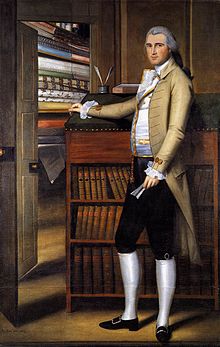Elijah Boardman
| Elijah Boardman | |
|---|---|

Elijah Boardman, painted by Ralph Earl in 1789
|
|
|
United States Senator from Connecticut |
|
|
In office March 4, 1821 – August 18, 1823 |
|
| Preceded by | James Hillhouse |
| Succeeded by | Henry W. Edwards |
| Personal details | |
| Born | March 7, 1760 New Milford, Connecticut Colony |
| Died | August 18, 1823 (aged 63) Boardman, Ohio, U.S. |
| Resting place | New Milford, Connecticut |
| Nationality | American |
| Political party | Democratic Republican |
| Children | William Whiting Boardman |
| Residence | Litchfield, Connecticut |
| Alma mater | Home tutored |
| Occupation | Dry goods merchant |
| Religion | Episcopalian |
Elijah Boardman (March 7, 1760 – August 18, 1823) was a senator from Connecticut. Born to a noted and politically connected Connecticut family, he served in the United States Army before becoming a noted merchant and businessman. Becoming involved in property and land ownership in Connecticut and Ohio, he founded the towns of Boardman and Medina. His involvement in politics also increased, and he gradually rose through the ranks of the local, and then national government in the United States Senate. He served as Senator for Connecticut until his death in Ohio.
Boardman, an Episcopalian, was born in New Milford in Connecticut, the third of four children for Deacon Sherman Boardman (1728–1814) and Sarah Bostwick Boardman (1730–1818). His father, a first minister, was a "prosperous farmer", well educated and well versed in local politics – he was 21 times elected as a member of the General Assembly of Connecticut – and was familiar with "civil and military concerns of the town." The Boardman family were the town's founding family, and lived on a "substantial farm" on the Housatonic River.
A biographer of his later wife wrote of Elijah Boardman: "Inheriting many of the good qualities of his father and his grandfather, he combined, with those good qualities, the energy and intrepidity of his mother and of his grandmother, respecting both of whom there are preserved family traditions of much historical and domestic interest." The biographer also noted Boardman to be "dignified" in personal appearance, and handsome. His brother, Davind Sherman Boardman, remarked that he was "inclined" to hilarity. Elijah Boardman was educated by private tutors – including tutoring in Latin by the Reverend Nathaniel Taylor and other matters by his own mother – at home before enlisting in the local militia to serve in the American Revolutionary War as a "common soldier", in March 1776 aged 16.
...
Wikipedia
